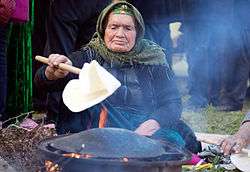Yufka
| Flatbread making and sharing culture: Lavash, Katyrma, Jupka, Yufka | |
|---|---|
 | |
| Country | Azerbaijan, Iran, Kazakhstan, Kyrgyzstan, Turkey |
| Domains | Food |
| Reference | 1181 |
| Region | Europe and North America |
| Inscription history | |
| Inscription | 2016 (11th session) |
- For the pastry leaves used for börek and baklava, see filo.
Yufka is a thin, round, and unleavened flat bread in Turkish cuisine. It is similar to lavash, and about 18 inches (40–50 cm) in diameter. It is usually made from wheat flour, water and salt. After kneading, the dough is allowed to rest for 30 min. Dough pieces (ca. 5-6 oz/150-200 g) are formed into balls and then rolled out into a circular sheet. The sheets of yufka dough are baked on a heated iron plate called a sac for about 2–3 minutes. During baking, the bread is turned over once to brown the other side. After baking, yufka bread has a low moisture content, and depending on how low the moisture is, a long shelf life. Before consumption, dry yufka bread is sprayed with warm water. The moistened bread is covered with a cotton cloth and is rested for 10 to 12 minutes before serving.
In Bulgarian and Macedonian cuisine (Bulgarian: юфка; Macedonian: јуфка, but usually plural, јуфки (jufki)), yufka refers to a special type of home-made pasta that usually looks flat or squared.
In Serbian cuisine, jufka is a very thinly stretched sheet of dough used for baking savory and sweet dishes.
See also
References
